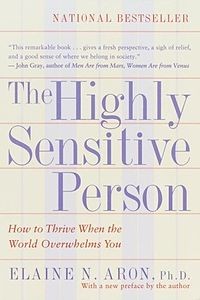In her national bestseller
The Highly Sensitive Person: How to Thrive When the World Overwhelms You,
author Elaine Aron defines a distinct personality trait that affects as many as one out of every five people.
According to Dr. Aron's definition, the Highly Sensitive Person (HSP) has a sensitive nervous system, is aware of subtleties in his/her surroundings, and is more easily overwhelmed when in a highly stimulating environment.
Additionally, she says, the success of The Highly Sensitive Person is cause for celebration:
"We've done it ourselves"
And not surprisingly, since we are 15 to 20 percent of the population
- that's fifty million in the United States.
Highly sensitive people are real, we exist, and we've proven it.
That alone is something to celebrate.
Another cause for Aron and her fellow HSPs to celebrate is the acceptance into mainstream psychology of the HSP personality trait.
After numerous in-depth interviews, as well as surveys of over one thousand people, Dr. Aron's findings have been published in Counseling Today, Counseling and Human Development, and the prestigious Journal of Personality and Social Psychology.
Elaine Aron has a doctoral degree in clinical psychology and a thriving psychotherapy practice. She is the first therapist to tell HSPs how to identify their trait and make the most of it in everyday situations.
Highly Sensitive People have an uncommonly sensitive nervous system - a normal occurrence, according to Aron. "About 15 to 20 percent of the population have this trait.
It means you are aware of subtleties in your surroundings, a great advantage in many situations.
It also means you are more easily overwhelmed when you have been out in a highly stimulating environment for too long, bombarded by sights and sounds until you are exhausted."
An HSP herself, Aron reassures other Highly Sensitives that they are quite normal.
Their trait is not a flaw or a syndrome, nor is it a reason to brag. It is an asset they can learn to use and protect.
In defining the Highly Sensitive Person, Dr. Aron provides examples of characteristic behaviors, and these are reflected in the questions she typically asks patients or interview subjects:
- Are you easily overwhelmed by such things as bright lights, strong smells, coarse fabrics, or sirens nearby?
- Do you get rattled when you have a lot to do in a short amount of time?
- Do you make a point of avoiding violent movies and TV shows?
- Do you need to withdraw during busy days, into bed or a darkened room or some other place where you can have privacy and relief from the situation?
- Do you make it a high priority to arrange your life to avoid upsetting or overwhelming situations?
- Do you notice or enjoy delicate or fine scents, tastes, sounds, or works of art?
- Do you have a rich and complex inner life?
- When you were a child, did your parents or teachers see you as sensitive or shy?
Dr. Aron explains that in the past HSPs have been called "shy," "timid," "inhibited," or "introverted," but these labels completely miss the nature of the trait.
Thirty percent of HSPs are actually extraverts. HSPs only appear inhibited because they are so aware of all the possibilities in a situation.
They pause before acting, reflecting on their past experiences. If these were mostly bad experiences, then yes, they will be truly shy.
But in a culture that prefers confident, "bold" extraverts, it is harmful as well as mistaken to stigmatize all HSPs as shy when many are not.
InThe Highly Sensitive Person, Dr. Aron reframes these stereotyping words and their common application to the HSP in a more positive light and helps HSPs use and view these aspects of their personality as strengths rather than weaknesses.
Sensitivity is anything but a flaw.
Many HSPs are often unusually creative and productive workers, attentive and thoughtful partners, and intellectually gifted individuals.
According to Dr. Aron, HSPs could contribute much more to society if they received the right kind of attention - and her national bestseller proves that this 15 to 20 percent of the population is eager to get off on the right foot in asserting their unique personality trait.
you`ll find more info using the link below
http://www.hsperson.com/pages/test.htm
